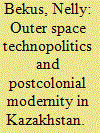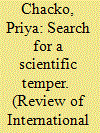| Srl | Item |
| 1 |
ID:
185927


|
|
|
|
|
| Summary/Abstract |
This article examines the role of outer space technopolitics in post-Soviet Kazakhstan. It explores how outer space, the technological artefact of global relevance, works as a postcolonial fetish of modernity that is called upon to produce what it represents, that is, the reality of a technologically advanced Kazakh nation. The article shows that in its project of becoming a spacefaring nation the country reiterates major incentives that have motivated nuclear and space programme development in the postcolonial context of the Global South. It explores how collaboration with Russia allows Kazakhstan to claim its share in the Soviet space legacy rather than to distance itself from it. The study then traces the rise of a new internationalism in the Kazakhstani space programme outside the post-Soviet context. The article contributes to the debate on postcolonial technopolitics and shows how outer space has been used to enhance the conventional domain of postcolonial national ideologies – nativism and tradition – with technology and science. Finally, it depicts how the growing resistance to the space programme among Kazakh civil society groups reveals a close association of the environmental agenda with an ‘eco-nationalism’ permeated by a profoundly anti-imperial and, ultimately, anti-authoritarian political discourse.
|
|
|
|
|
|
|
|
|
|
|
|
|
|
|
|
| 2 |
ID:
101741


|
|
|
|
|
| Publication |
2011.
|
| Summary/Abstract |
This article examines the relationship between India's nuclear programme and its postcolonial identity. In particular, I argue that making sense of the anomalies and contradictions of India's nuclear behaviour, such as the gap of two decades between its nuclear tests, its promotion of nuclear disarmament and its failure to sign non-proliferation and test-ban treaties requires an understanding of the racially gendered construction of India's postcolonial modernity and the central roles given to science and morality within it. I suggest that India's postcolonial identity is anchored in anticolonial discourses that are deeply ambivalent toward what was viewed as a Western modernity that could provide material betterment but was also potentially destructive. What was desired was a better modernity that took into account what was believed to be Indian civilisation's greater propensity toward ethical and moral conduct. India's nuclear policies, such as its pursuit of nuclear technology and its promotion of disarmament cannot be seen in isolation from the successes and failures of this broader project of fashioning an ethical modernity.
|
|
|
|
|
|
|
|
|
|
|
|
|
|
|
|